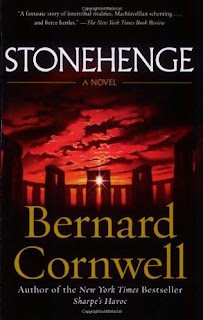"To compensate a little for the treachery and weakness of my memory, so extreme that it has happened to me more than once to pick up again, as recent and unknown to me, books which I had read carefully a few years before . . . I have adopted the habit for some time now of adding at the end of each book . . . the time I finished reading it and the judgment I have derived of it as a whole, so that this may represent to me at least the sense and general idea I had conceived of the author in reading it." (Montaigne, Book II, Essay 10 (publ. 1580))
Stonehenge (Bernard Cornwell, 2001)
 Summary below. I actually enjoyed this one quite a bit even though it's not in my normal reading zones. It did drive imagination as to what might have been going on with Stonehenge.
Summary below. I actually enjoyed this one quite a bit even though it's not in my normal reading zones. It did drive imagination as to what might have been going on with Stonehenge.
Another Cornwell novel, also well researched (as far as I know), also via audio book while commuting.
_______________
"He imaginatively unlocks the mystery of Stonehenge's creation in 2000 B.C., at the beginning of Britain's Bronze Age. Lengar, the eldest, murders his own father to become the chief of his tribe. Camaban, a sorcerer ruthlessly determined to have a massive stone temple. The youngest, Saban, will ultimately construct the temple, but not until he has endured torture, slavery and betrayal. The story covers nearly 20 years as the brothers and the people of Ratharryn struggle to survive as a tribe. It is Camaban's idea to build Stonehenge as a temple to create balance between the moon god and the sun god, to eliminate winter and force a change in the circle of life. Cornwell's detailed descriptions of how Stonehenge was constructed utilizing primitive engineering are the real strength of this book."
 Summary below. I actually enjoyed this one quite a bit even though it's not in my normal reading zones. It did drive imagination as to what might have been going on with Stonehenge.
Summary below. I actually enjoyed this one quite a bit even though it's not in my normal reading zones. It did drive imagination as to what might have been going on with Stonehenge.
No comments:
Post a Comment